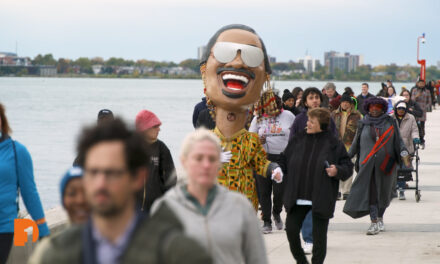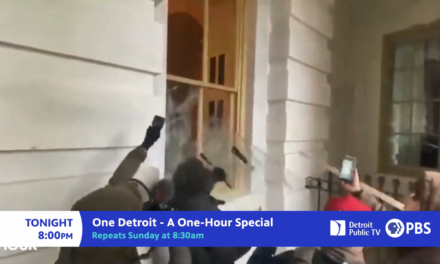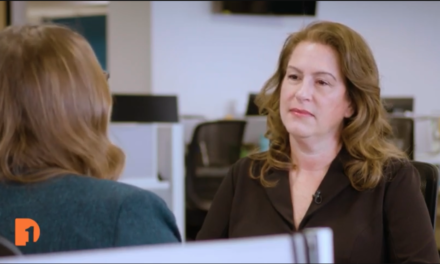One Detroit Managing Editor Christy McDonald moderates a roundtable discussion with contributors Stephen Henderson and Nolan Finley on the state of our nation’s democracy. Plus, Stephen and Nolan speak with U.S. Congresswoman Brenda Lawrence and Congressman Fred Upton, respectively, about being at the U.S. Capitol during the Jan. 6 insurrection. The congress members address the attacks, express their feelings about the state of our democracy, and discuss how the attacks have affected our democracy’s trajectory.
Transcript, Part One:
Christy McDonald, One Detroit, DPTV: With me now are One Detroit contributors, Nolan Finley, the editorial page editor of the Detroit News, and Stephen Henderson, host of American Black Journal. You know, guys, when you watch that story, I think mostly about the process of vote counting, who can be a challenger, and really how fast misinformation can spread. Stephen, what were your thoughts coming out of this?
Stephen Henderson, Host, American Black Journal: Well, I mean, it brought back really bitter memories, and I think bitter is the right word. I mean, the challenge to the idea that Detroiters weren’t voting, that African-American Detroiters weren’t voting was completely unfounded and based on racist mythology. And you know, the challenges to the votes, the hoopla outside trying to disrupt all of it. It was completely inappropriate. And as somebody who is the son of somebody who didn’t get to vote in this country until the Voting Rights Act passed, it reminds me of the same kinds of arguments that got made before about illegitimacy and Black voters.
Christy McDonald: Nolan, what were some of your perceptions?
Nolan Finley, Editorial Page Editor, The Detroit News: Well, I think that 2020 was a very difficult time to have an election, and all of the rapid changes, all of the new procedures that were put in place, created an atmosphere of mistrust. And that’s never good. And so a lot of people saw things they misinterpreted; thought they saw things they didn’t see. And I think that speaks to why we need to address transparency. We need to be very careful in explaining anytime we change how voting is done and how vote counting is done. People need to understand what they were seeing and clearly they didn’t understand or didn’t want to understand what they were seeing that night.
Christy McDonald: Have we learned from it in moving forward, Stephen?
Stephen Henderson: No. I would like to say we have and in some ways, I think the local reaction to it has been really great. I mean, we’ve got a Secretary of State in Michigan who’s really focused on trying to make sure that there aren’t reasons to question, and trying to tighten up procedures so that things that have gone on for years and years and years that aren’t as clear to the public as they should be are made clear. But at the same time, we have a really concerted effort by the people who perpetrated the misinformation on election night in 2020 to carry that over into 2022 and especially into 2024— both at the… through legislation that they’ve been trying to pass and posts that they’re trying to win where they can question the outcome of votes.
Nolan Finley: I think we tend not to learn anything in Michigan except how to fight, and that’s what we’re doing now. There’s no reason that the two parties can’t get together and decide what changes actually need to be made in the voting process, what things need to be put in place, what steps to make sure the vote is secure and and there is integrity in the elections. I think, you know, nobody will give an inch here in this state on so many issues, including voting.
Christy McDonald: We’re going to talk about some of those challenges to voting access and to process that are happening not only in Michigan but across the country right now, and how that really contributes to how we feel about our democracy and if the government is really working for us right now. But I do want to say that each one of you talked to a member of our congressional delegation. Stephen, you talked to Brenda Lawrence and Nolan, you talked to Fred Upton. Both were there at the Capitol on January 6th and they talk about their work now in D.C. a year later. Let’s go ahead and take a listen to those interviews.
Transcript, Part Two:
Christy McDonald, One Detroit, DPTV: All right, back here now with Nolan Finley and Stephen Henderson. Nolan, let me start with you and ask you to describe what you feel is the political climate in Michigan right now?
Nolan Finley, Editorial Page Editor, The Detroit News: You know, we have been making a little progress lately in getting agreements on spending. As much as I sort of objected to the independent redistricting commission and the results it produced, I think had that been left with the Legislature and the governor, it might never have gotten done. So I mean, there’s just so many things that we can’t come to consensus on in this state, and, you know, I think that’s in some ways a natural product of having two parties sharing control. But some points you’ve got to learn to come up, come to agreement on practical solutions, and we’re not consistently getting there today.
Christy McDonald: Steve, would you agree with that or how would you describe the political atmosphere?
Stephen Henderson, Host, American Black Journal: Yeah, I think it’s pretty rotten, and we’ve got to be clear about what is driving a lot of that. I mean, you have one party in this, in this country, in this state, that is increasingly influenced by people who don’t want to see everybody have the same access to voting, who want to question institutions like voting in the face of no evidence, of course, that there’s any issue. I mean, all of the claims that were made about voting in 2020 that turned out to be just false, absolutely false, and yet we hear this constant narrative questioning that. That party— Republican Party is influenced by that. It’s hard to have a conversation with people who don’t want to see the rules executed in a way that’s fair to everybody. We’ve got to have both parties be able to have these conversations on a level playing field when it comes to things like the rules, and we can’t do that right now because of these influences on the right side of the political spectrum.
Nolan Finley: I think one of the problems we have in this country is the emergence of hard partisanship that has taken the place of principle. And this extreme loyalty to party is destructive to the country, whether it’s Republicans or Democrats. But to Steve’s question, I mean, when he talks about changing the rules, the rules were changed radically in Michigan before the 2020 vote and changed by Democrats. And, you know, the courts checked Jocelyn Benson on some of the rule changes she wanted to force through, but still they force through a number of them without getting a consensus and without even trying to get in a consensus. And I think that led to the mistrust.
We hear Democrats and folks on the left saying, ‘Well, gosh, nothing was wrong with the 2020 election. There was no fraud. Everything went as it should.’ I tend to agree with that. But why then do they want to take over elections from the states and give it to the federal government, contrary to what the Constitution dictates if everything went so well in 2020? Why do we want to give the federal government such control over a function that’s clearly assigned to the states?
Stephen Henderson: So the rules were changed, let’s be clear, by the people of Michigan in 2018, radically. It was not Democrats that voted to…
Nolan Finley: That’s one issue. But before the 2020 vote…
Stephen Henderson: It wasn’t all of them. It wasn’t one issue…
Nolan Finley: Jocelyn Benson and Democrats put in all sorts of new rules and requirements…
Stephen Henderson: Let’s be clear what she was doing. The constitutional changes in 2018 required all kinds of things to be executed in a way that made sense. They were radical changes that the people voted for. What the Secretary of State was trying to do was make those things work at a practical level at all of these different polling sites and all these different communities. And the question about federal involvement, that is for voter protection, which is the federal government’s obligation.
It is the reason that we had to have a Voting Rights Act in the first place. It’s the reason that the Republicans, for instance, have decimated that legislation and passed it aside and don’t want to take it up again is because what they fear is that it leads to more people of color voting in this country, voting mostly for Democrats, of course. And so, Republicans don’t want it.
Nolan Finley: You look at what Democrats are doing in the name of voter participation, increasing voter participation? 800,000 non-citizens being allowed to vote in New York City. That erodes trust.
Christy McDonald: Should there be concern, less about access and more about the post-vote process? Are we putting emphasis in the wrong place?
Nolan Finley: You need to emphasis on both, but certainly you knew… you need some structure in place as we move to this new way of voting. I think vote by mail is here to stay, early voting’s here to stay. I think we’ll move into electronic voting. All those changes need to come with processes that ensure the integrity of the vote and we’re not keeping up.
Stephen Henderson: We’re not keeping up, then you would see all these instances of fraud that people are talking about taking hold, and they’re not. There isn’t any more fraud now than there was before there was mail in voting. There’s not more voter fraud before early voting, because of early voting.
Christy McDonald: I think you’re both illustrating the point right now that we are very far apart and there are— it feels like both Democrats and Republicans, and you can even take party out, or you can just take leaning, that they’re entrenching, you’re entrenching so far now onto either side. So where do we stand?
Nolan Finley: I think democracy is held and held very well. You’ve got more people expected to file for office and run for office in Michigan and across the country this year than ever before. Do we trust the process? I think no. But there’s a lot of reasons we don’t trust the process, because I think our political leaders have done everything they can possible to break that trust.
Stephen Henderson: There shouldn’t be barriers to voting for people who are eligible to vote. Whether you have ID or not, which is a matter of all kinds of other conditions that we’ve invented in this country, should not affect your voting status. And that’s why Democrats push back. I think we will see where we are with this democracy with the elections this year if we see a repeat of the kinds of efforts at disenfranchisement, at disqualification that we saw in 2020.
Subscribe to One Detroit’s YouTube Channel & Don’t miss One Detroit Mondays and Thursdays at 7:30 p.m. on Detroit Public TV, WTVS-Channel 56.
Catch the daily conversations on our website, Facebook, Twitter @DPTVOneDetroit, and Instagram @One.Detroit
View Past Episodes >
Watch One Detroit every Monday and Thursday at 7:30 p.m. ET on Detroit Public TV on Detroit Public TV, WTVS-Channel 56.




